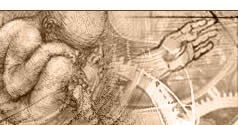| 84 |
Reports of the flood
|
| |
Flood reports from ancient cultures in all five continents show that at least one gigantic deluge must actually have taken place in the past.
|
| 85 |
The age of humanity
|
| |
The remains left to us by our ancestors (especially stone tools) provide evidence for several thousand years of human history at most.
|
| 86 |
Neanderthals and australomorphs
|
| |
No undisputed trace has yet been found of the hypothetical common ancestor of apes and humans.
|
| 87 |
The human and chimpanzee genomes
|
| |
At least 75 million correct mutations would have been necessary to make a modern human and a chimpanzee from a common ancestor a highly improbable scenario.
|
| 88 |
Upright gait
|
| |
The upright gait of humans requires simultaneous and coordinated changes of several characteristics in the skeleton and muscles, which clearly contradicts the notion of chance, unguided development.
|
| 89 |
The human eye
|
| |
The human eye is an irreducibly complex system that Darwin himself mentioned as possible evidence against his theory.
|
| 90 |
The inverse retina
|
| |
New research confirms that the arrangement of the light-sensitive cells in the human eye represents an optimized design, refuting earlier claims to the contrary.
|
| 91 |
The degeneration of human language
|
| |
Investigations of ancient languages have revealed that they were complex at first and grew simpler over time, which contradicts the notion of an upwards evolutionary development of human beings.
|
| 92 |
Human consciousness
|
| |
Investigations of so-called near-death experiences strongly suggest that human consciousness exists independently of the body.
|
| 93 |
Human creativity
|
| |
The human capacity for technical and artistic creativity constitutes clear evidence that the human spirit could not possibly have emerged from matter.
|
| 94 |
Conscience and ethics
|
| |
Conscience and ethics are hardly things that would have evolved in an unpitying fight for survival that has been going on for millions of years.
|
| 95 |
Love, joy, suffering and sorrow
|
| |
It is impossible to reconcile the existence of the phenomenon of love with the ideas underlying the theory of evolution.
|

